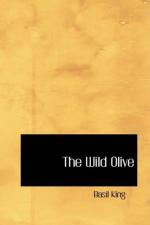So he found himself, one bright afternoon, watching the races from the lawn of the Hipodromo of the Jockey Club. He was fond of horses, and he liked a good race. When he went to the Hipodromo it was for the sporting, not the social, aspect of the affair. Nevertheless, as he strolled about, he watched for that occasional velvety glance that gave him pleasure, and amused himself with the types seated around him, or crossing his path—heavy, swarthy Argentines, looking like Italian laborers grown rich—their heavy, swarthy wives, come out to display all the jewels that could be conveniently worn at once—pretty, dark-eyed girls, already with a fatal tendency to embonpoint, wearing diamonds in their ears and round their necks as an added glory to costumes fresh from the rue de la Paix—grave little boys, in gloves and patent-leather boots, seated without budging by their mammas, sucking the tops of their canes in imitation of their elder brothers, who wandered about in pairs or groups, all of the latest cut, eying the ladies but rarely addressing them—tall Englishmen, who looked taller than they were in contrast to the pudgy race around them, as the Germans looked lighter and the French more blond—Italian opera singers, Parisian actresses Spanish dancers, music-hall soubrettes—diplomats of all nations—clerks out for a holiday—sailors on shore—tourists come to profit by a spectacle that has no equal in the southern world, and little of the kind that is more amusing in the north.
As Strange’s glance roamed about in search of a response he not infrequently received it, for he was a handsome fellow by this time—tall, well dressed, and well set up, his trim, fair beard emphasizing the clear-cut regularity of his profile, without concealing the kindliness that played about the mouth. A little gray on the temples, as well as a few tiny wrinkles of concentration about the eyes, gave him an air of maturity beyond his age of thirty-two. The Anglo-Saxon influence in the Argentine is English—from which cause he had insensibly taken on an English air, as his speech had acquired something of the English intonation. He was often told that he might pass for an Englishman anywhere, and he was glad to think so. It was a reason the less for being identified as Norrie Ford. It sometimes seemed to him that he could, in case of necessity, go back to North America, to New York, to Greenport, or even to the little county town where he had been tried and sentenced to death, and run no risk of detection.
* * * * *
The staring of other men first directed his attention toward her. She was sitting slightly detached from the party of Americans to whom she clearly belonged, and in which the Misses Martin formed the merrily noisy centre. Though dressed in white, that fell softly about her feet, and trained on the grass sidewise from her chair, her black cuffs, collar and hat suggested the last days of mourning. Whether or not she




